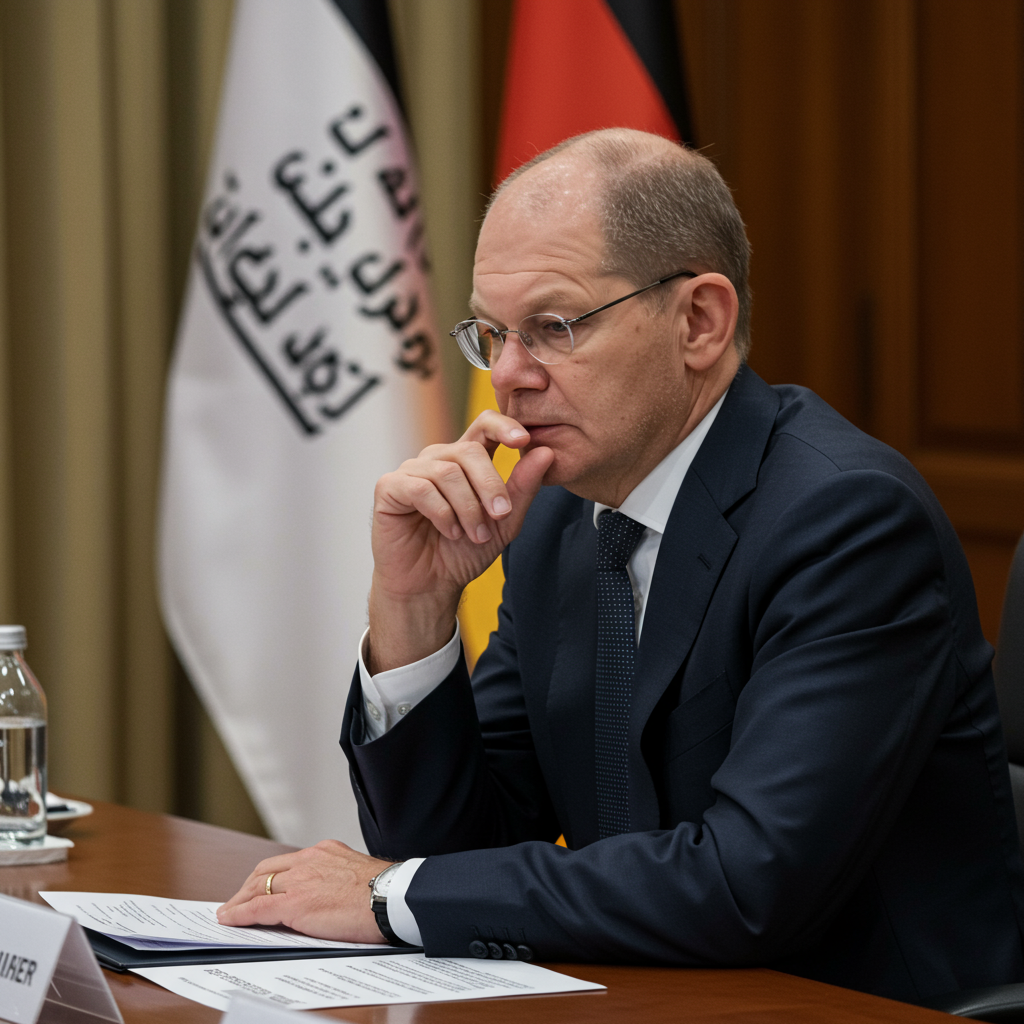Germany’s traditionally unwavering support for Israel is facing a pivotal moment. A recent visit by German Foreign Minister Johann Wadephul to Jerusalem signaled a notable shift, marked by a tougher diplomatic tone aimed at addressing the escalating humanitarian crisis in Gaza. This change reflects growing international and domestic pressure on Berlin to demand greater accountability and more effective aid delivery, even as the complex historical bond between the two nations continues to shape policy.
A Diplomatic Tightrope: Germany’s New Demands
On August 2, 2025, German Foreign Minister Johann Wadephul engaged in high-stakes discussions with Israeli Prime Minister Benjamin Netanyahu and United Nations representatives in Jerusalem. His primary objective: to apply substantial pressure on the Israeli government. Wadephul issued an urgent appeal, demanding immediate and unrestricted access for the UN to deliver essential aid to the starving population in Gaza. He emphasized the critical need for the “efficient, established UN system” to transport and distribute assistance safely.
Wadephul did not mince words, describing the suffering and death in Gaza as “unimaginable.” Beyond humanitarian appeals, he also urged the militant group Hamas, which is designated a terrorist organization by Germany, the US, and Israel, to cease hostilities and release all remaining hostages. Prior to his departure from Germany, Wadephul had already warned that Israel was facing increasing international isolation. He also signaled Berlin’s readiness to respond to any unilateral actions by Israel, specifically criticizing potential plans to annex the occupied West Bank.
Gaza’s Dire Reality: A Preventable Famine
The humanitarian situation in Gaza has deteriorated to catastrophic levels, painting a stark picture of widespread famine and critical shortages. Dr. Mohammed Salha, overseeing eight clinics and a hospital in Gaza, reports a staggering increase in daily cases of individuals seeking food supplements and powdered formulas—from a pre-famine average of 250 to over 2,000. These desperate individuals are often turned away due to a complete depletion of supplies, with specialized departments for malnourished children utterly devoid of nutritional support.
International bodies corroborate this grim reality. The Integrated Food Security Phase Classification (IPC), a leading global authority on hunger, confirms a “worst-case scenario of famine” unfolding across Gaza. The World Health Organization (WHO) added that 63 people, including many children, had starved to death in July alone, underscoring that this crisis “remains entirely preventable.”
The primary driver of these critical shortages is attributed to a full Israeli blockade initiated in early March. Despite Israeli claims that aid diversion by Hamas necessitates alternative mechanisms like the Gaza Humanitarian Foundation (GHF), an internal review by the United States Agency for International Development (USAID) found no evidence to support such assertions.
Contested Aid and Conflicting Narratives
A significant point of friction revolves around aid distribution mechanisms. Germany, along with other international aid organizations, advocates for the United Nations and the World Food Program to manage supplies. Conversely, Israel and its main ally, the United States, champion the newly created and controversial Gaza Humanitarian Foundation (GHF). US Special Envoy Steve Witkoff demonstratively visited a GHF distribution site near Rafah, while the US ambassador claimed the GHF had provided 100 million meals in two months.
However, the UN and other aid groups dispute the GHF’s effectiveness, citing alarming reports of hundreds of people killed or wounded while attempting to access GHF aid. The UN human rights office documented nearly 1,400 fatalities since late May, including 859 near GHF sites and 514 along aid convoy routes. Human Rights Watch has even accused Israeli forces of “serious violations of international law and war crimes” for opening fire on civilians at these sites. Wadephul firmly rejected Israel’s assertion that aid would benefit Hamas, stating that the current humanitarian catastrophe is too severe to justify further aid impediments.
Israel’s Foreign Minister Gideon Saar did not publicly comment on Germany’s specific aid suggestions but vocally refuted accusations from far-right Israeli Minister Itamar Ben-Gvir, who controversially claimed Germany was supporting Nazis. Saar affirmed Germany as a “friendly country” and Wadephul as a “friend of Israel,” despite acknowledged “differences of opinion.” These differences notably include Israel’s rejection of a two-state solution, which Germany continues to advocate, and its justification of West Bank settlements, which Berlin criticizes. Israeli Prime Minister Benjamin Netanyahu has explicitly denied blocking aid or causing famine, a stance directly contradicted by international reports and US President Donald Trump, who also remarked on the “real starvation” in Gaza.
Germany’s Evolving European Position
Germany’s diplomatic shift is particularly significant given its historical and moral commitment to Israel, often termed a “special responsibility” stemming from the Holocaust. This deep-seated bond has historically positioned Germany as one of Israel’s staunchest international supporters, leading to a long-standing bias that emphasized Israel’s “right to self-defense.” Germany was Israel’s largest European arms supplier in 2023, accounting for 33% of Israel’s total arms imports with approximately €326 million in military exports.
However, the relentless escalation of the humanitarian crisis in Gaza has pressured Berlin to re-evaluate its approach. German Chancellor Friedrich Merz conceded that Israeli strikes “no longer reveal any logic,” while Foreign Minister Wadephul described the Gaza situation as “unbearable,” signaling a new precedent in German foreign policy. This rhetorical shift aligns with a broader transformation in European attitudes, moving from initial support to escalating criticism.
An axis of progressive European nations, including Spain, Ireland, Norway, and Slovenia, has taken more assertive steps. Spain, for instance, has suspended all military exports to Israel since October 2023 and formally recognized the State of Palestine. While Germany has not yet followed suit on such punitive measures, its tightening rhetoric marks a clear departure from its prior restrained posture.
Domestic Pressure and Unlikely Sanctions
The shift in Germany’s stance is not only a response to the dire situation on the ground but also to considerable domestic pressure. A Forsa survey, commissioned by Stern magazine, revealed that nearly three-quarters (74%) of Germans believe their government should exert more pressure on Israel to address the humanitarian crisis and facilitate an end to the conflict. This sentiment is strong across the political spectrum, including supporters of the ruling coalition parties.
Prominent German politicians are echoing this call. Dirk Wiese, leader of the Social Democrats’ parliamentary group, stated, “The time for talk has passed. We need political pressure and concrete progress.” Andreas Reinicke, director of the German Orient-Institute, suggests Germany’s influence on Israel “is greater than is commonly assumed” and that achieving a two-state solution requires an “active process” beyond mere verbal support.
Despite this sharpening tone, observers in Berlin generally agree that concrete punitive measures such as sanctions, halting weapons deliveries, or unilaterally recognizing a Palestinian state remain unlikely. This reluctance is primarily due to Germany’s profound “special responsibility” towards Israel rooted in the Holocaust, a factor that continues to heavily influence its foreign policy decisions. Symbolic actions, such as the German air force’s aid drops into Gaza from Jordan, are underway, but even Wadephul acknowledges these are largely symbolic and insufficient, stressing the need for hundreds of daily truckloads of aid.
Global Diplomatic Efforts and Future Outlook
The German diplomatic push occurs within a complex web of ongoing international efforts. US Special Envoy Steve Witkoff’s recent visit to Israel also centered on breaking the deadlock in Gaza truce talks, with discussions reportedly shifting towards a more comprehensive deal. This expanded objective aims for the release of all hostages, disarmament of Hamas, and demilitarization of Gaza, alongside increasing humanitarian aid. However, indirect ceasefire negotiations in Doha have remained inconclusive, with significant gaps persisting between Israel and Hamas.
Internationally, there is growing support for a two-state solution, endorsed by nations like France and Saudi Arabia. Yet, Israel’s government, particularly its far-right factions, explicitly rejects the idea of the Palestinian Authority gaining control of Gaza and continues to support West Bank settlement expansion. German Foreign Minister Wadephul himself reiterated that Germany’s recognition of a Palestinian state would only come at the culmination of negotiations for a two-state solution, aligning with a cautious European approach.
The outcome of Germany’s tougher stance remains difficult to predict. While it certainly adds to Israel’s growing international isolation and signals a potential shift in long-standing Western alliances, its practical impact may be constrained without broader European consensus on decisive punitive measures. Nonetheless, Germany’s willingness to use more direct and critical language marks a significant evolution in its relationship with Israel, driven by the acute and undeniable humanitarian catastrophe in Gaza.
Frequently Asked Questions
Why is Germany shifting its stance on Israel, despite historical ties?
Germany’s shift is driven by the escalating humanitarian crisis in Gaza, characterized by widespread famine and preventable deaths. While maintaining a strong historical bond with Israel due to the Holocaust, mounting international pressure, coupled with significant domestic public opinion favoring a tougher stance, has compelled Berlin to adopt a more critical diplomatic tone. German officials are increasingly emphasizing the urgent need for humanitarian aid and a two-state solution, diverging from previous unwavering support.
What are the main obstacles to effective humanitarian aid delivery in Gaza?
Effective aid delivery in Gaza faces multiple significant obstacles. These include a full Israeli blockade, disputes over aid distribution mechanisms (with the UN and World Food Program advocated by Germany versus the controversial Gaza Humanitarian Foundation preferred by Israel and the US), and reports of violence at aid distribution points. Despite symbolic aid efforts like German airdrops, the primary challenge remains getting sufficient aid—hundreds of truckloads daily—through ground crossings safely and consistently.
What are the potential long-term implications of Germany’s tougher diplomatic approach?
Germany’s tougher diplomatic approach, while unlikely to immediately lead to sanctions or a halt in arms sales due to its “special responsibility” towards Israel, could have several long-term implications. It contributes to Israel’s increasing international isolation and may encourage other European nations to adopt more critical stances. This shift also strengthens the international legal framework for Palestinians by legitimizing calls for a two-state solution and potentially leading to a review of trade agreements like the EU-Israel Association Agreement.


